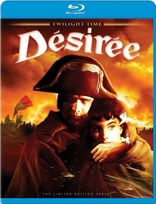Désirée Blu-ray Movie
HomeDésirée Blu-ray Movie 
Limited Edition to 3000 - SOLD OUTTwilight Time | 1954 | 110 min | Not rated | Apr 10, 2012
Movie rating
7.1 | / 10 |
Blu-ray rating
| Users | 4.5 | |
| Reviewer | 3.5 | |
| Overall | 3.6 |
Overview
Désirée (1954)
The rise and fall of Napoleon Bonaparte as seen through the eyes of a woman who spurned him when he was impoverished and then fell in love with him as he rose to power but was unrequited in her passion as he married Josephine.
Starring: Marlon Brando, Jean Simmons, Merle Oberon, Cameron Mitchell, Michael RennieDirector: Henry Koster
| Drama | 100% |
| Romance | 61% |
| Biography | 26% |
Specifications
Video
Video codec: MPEG-4 AVC
Video resolution: 1080p
Aspect ratio: 2.55:1
Original aspect ratio: 2.55:1
Audio
English: DTS-HD Master Audio 4.0 (48kHz, 24-bit)
Music: DTS-HD Master Audio 2.0
Subtitles
None
Discs
50GB Blu-ray Disc
Single disc (1 BD)
Playback
Region free
Review
Rating summary
| Movie | 3.0 | |
| Video | 4.0 | |
| Audio | 4.0 | |
| Extras | 2.0 | |
| Overall | 3.5 |
Désirée Blu-ray Movie Review
Is that your hand in your jacket, or are you just glad to see me?
Reviewed by Jeffrey Kauffman April 10, 2012Napoleon Bonaparte is having something of a film comeback of late, with the much talked about San Francisco exhibition of the restored version of Abel Gance’s silent masterpiece Napoleon, and now on a considerably smaller scale, this new Blu-ray release of the 1954 20th Century Fox CinemaScope feature Désirée. The name of Napoleon has become so iconic that its mere mention conjures visions of the petite Emperor, with hand thrust enigmatically in his waistcoat (a proclivity that has led to all sort of semi-hilarious theories, including everything from Napoleon suffering from ulcers or eczema to more mundane “solutions” attributing the position to him winding his watch). And many of the people who surrounded Napoleon, for good or ill, during his lifetime have also entered the public lexicon: Robespierre, his wife Josephine, his brother Joseph, and many others. But few other than rabid historians know about one Désirée Clary, née Bernardine Eugénie Désirée Clary, a fascinating woman who often appears as a footnote in biographies of Napoleon but who herself led a life of some accomplishment, at least with regard to her romantic life. Désirée was born in 1777 to a wealthy silk merchant in Marseille, and it was indeed her fortune, as expressed in the then current form of a dowry, that may have attracted an up and coming young French General, who had a position of some authority but no money of his own to speak of. This was not an unusual situation in that era, and in fact managed to somewhat balance the inequalities between the sexes, at least in the courting arena, when a potential suitor needed to mind his “P”’s and “Q”’s before his (or more correctly her) “F”’s (as in Francs) were securely tucked away in his pocket post- marriage. A fictionalized autobiography of Désirée’s life became an international bestseller in 1951, and it seemed to be the sort of perfect lavish period opportunity that suited the new widescreen “phenomenon” of CinemaScope, which was finally giving Fox honchos a little sense of relief after several years of box office attrition due to the increased popularity of television.
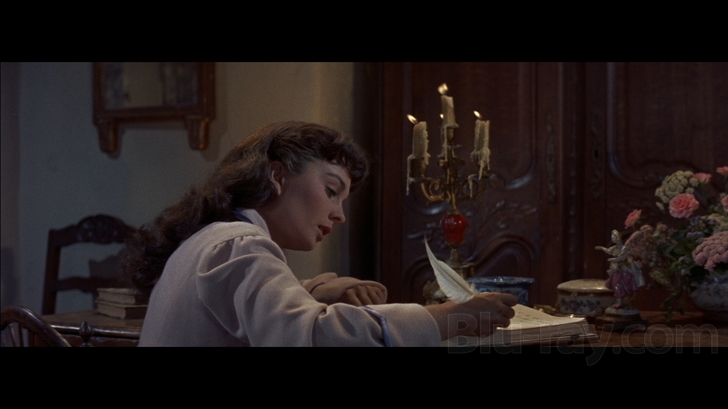
Henry Koster was a journeyman director with several big hits to his credit, as well as a number of interesting career sidebars like helping Deanna Durbin and Abbott and Costello find their filmic sea legs, but he never seemed to rise to the top echelons of his profession. His films are almost always well crafted, often with exceptional (and Oscar-nominated) performances, but they just as often lack a certain flair. Koster had directed the first CinemaScope feature, 1953’s The Robe, which became on of Fox’s biggest hits of that era. Koster moved directly on to Désirée in 1954. Fox’s 1954 slate of CinemaScope offerings featured two films with some interesting connections. The Egyptian was another quasi-religious epic like The Robe, albeit pre-Christian (though the Pharoah in the film was espousing monotheism), and seemed tailor made for the opulent widescreen vistas that CinemaScope offered. A certain Marlon Brando was initially cast to play the film’s lead, the title character, a physician named Sinuhe. Brando dropped out of the Michael Curtiz directed epic (Edmund Purdom took his place, not exactly a fair trade) and matriculated over to Désirée, a film which on its surface offered some of the epic scale that was already beginning to define the CinemaScope era, but which at its core presented a much more intimate story of a woman brushing up against a variety of historic characters.
Jean Simmons seemed to be the Queen of CinemaScope in the early days of the format, co-starring in three of the first Fox films utilizing the process, The Robe, The Egyptian and Désirée. Simmons is in fact the focus, if not the ostensible star, of the film, as its title should suggest. Désirée is a willful, somewhat impetuous young French woman, kind of like a Gallic Scarlett O’Hara in a way, and one who is out from the film’s very beginning to find both herself and her sister suitable suitors. That has led her to the brother Bonaparte, Joseph (Cameron Mitchell) and Napoleon (Marlon Brando). (In the somewhat hilarious department, yes, that is Richard Deacon—Mel from The Dick Van Dyke Show show—somewhat improbably cast as Désirée’s older brother Etienne). Napoleon makes it no secret that he and Joseph need wealthy wives with considerable dowries to further their ambitions, but he also makes it clear that his attraction to Désirée is not based solely on her wealth.
That sets the film on its main central course, where initially Napoleon and Désirée are engaged, but each moves on to marriages that, if not completely ones of convenience, don’t exactly produce sparks of animal magnetism, either. Napoleon weds Josephine (Merle Oberon) while Désirée ends up with older General Jean-Baptiste Bernadotte (Michael Rennie). Désirée therefore becomes a study in contrasts, with the star-crossed duo of Napoleon and Désirée putting their own wants on the back burner as they attempt to forge new relationships with their spouses. Désirée’s marriage is ostensibly the happier one, and in fact Merle Oberon’s Josephine is a study in wistfulness and perhaps something approaching clinical depression. Désirée has her own issues with maladjustment when Bernadotte accepts a request to become the King of Sweden and she follows her husband to a court for which she is equipped neither culturally nor emotionally. In the meantime, Napoleon’s megalomania has led to increasing conflicts within the French hierarchy, and he soon resorts to desperate measures with regard to Désirée in order to further his aim to conquer Russia.
As hard as it is to imagine Brando as The Egyptian’s Sinuhe, it’s perhaps just as difficult to preconceive the iconic actor as the legendary Napoleon, but the fact is he does a rather convincing job in portraying the introspective, moody and emotionally conflicted side of the legendary character. Though some might argue with his choice of a cultured English accent (probably done to match that of Jean Simmons’ similar idiolect), from a pure performance standpoint Brando is remarkably restrained and surprisingly effective. His final scenes with Simmons are especially affecting, as the two would be lovers look back over a lifetime of missed opportunities. Simmons is once again her usual stunningly beautiful and poised self, but she also brings a sense of both the steeliness and the vulnerability of this real life woman who is too often relegated to footnote status when she certainly deserves more than mere cursory examination.
Désirée is a big, sumptuous film with opulent production design and costumes (both of which received an Oscar nomination), and excellent performances by all of the leading cast. That still can’t quite save the film from its somewhat lethargic pace, as well as the major bugaboo that seems to haunt most films about legendary characters. When the people populating the film are already so much larger than life, expanding that grandiosity into widescreen splendor only serves to further remove them from a real connection to the audience. It’s like watching a tableau: it’s elegantly arranged, gorgeous to look at, but there isn’t a wealth of emotional impact, despite the film’s efforts to invest the story with some intimate touches of humanity.
Désirée Blu-ray Movie, Video Quality 
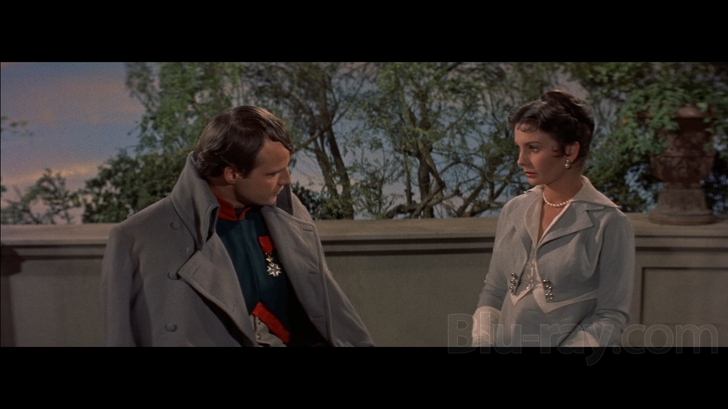
Désirée is presented on Blu-ray courtesy of Twilight Time with an AVC encoded 1080p transfer in 2.55:1. While this latest Fox CinemaScope release is head and shoulders better than last month's Demetrius and the Gladiators, there are a couple of minor issues to be aware of which may bother the more eagle eyed videophile. The elements here do have occasional damage, with a few specks and white flecks cropping up from time to time, but perhaps more troublingly things seem to be skewed toward the brown side of things, leading to some oddly pasty flesh tones. Strangely at other times flesh tones are quite noticeably on the yellow side of things, so perhaps this was not color timed against a reference print. These relatively minor qualms aside, this is otherwise a very sharp and appealing looking transfer, with well above average sharpness and clarity and some excellent fine detail in close-ups. Quite a few of the midrange shots are noticeably softer than the bulk of the film. Grain is natural looking and has obviously not been digitally scrubbed in any major way, and contrast is generally very good, though shadow detail is somewhat lacking in some dimly lit interior scenes. Other than the items mentioned above, colors are very well saturated, with reds and purples especially pleasing. Overall this is another solid looking release from an HD master provided to Twilight Time by Fox.
Désirée Blu-ray Movie, Audio Quality 

Désirée features a very nice sounding lossless DTS-HD Master Audio 4.0 mix that offers some decent surround activity and which presents the dialogue and especially Alex North's sweeping score with some really full sounding midrange and overall superb fidelity. Dynamic range is somewhat subdued in the film, but there are consistent, if not especially overwhelming, uses of discrete channelization, including well placed ambient environmental noises and occasionally directional dialogue. This track shows very little age related wear and tear, and even hiss is negligible in what is still a great sounding track, considering its age.
Désirée Blu-ray Movie, Special Features and Extras 
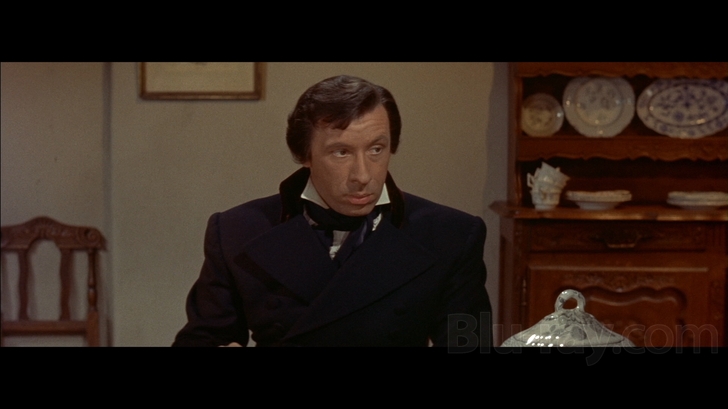
- Isolated Score. Twilight Time's hallmark is especially interesting this time around, as Alex North's score is rather unusual for this composer. Lushly romantic and melodically sweeping, North's score is almost Viennese in its ambience, something distinctly at odds with a lot of the composer's oeuvre. The score is presented in lossless DTS-HD Master Audio 2.0, another big plus.
- Original Theatrical Trailer (HD; 2:35). Note how the breathless hype of the narrator compares the book to Gone With the Wind, making my allusion above to Désirée as a quasi-Scarlett O'Hara a propos.
Désirée Blu-ray Movie, Overall Score and Recommendation 
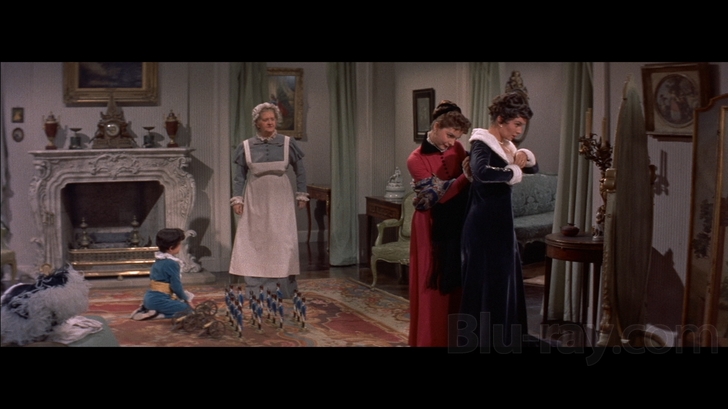
Désirée presents an unusual story which flirts with major historical figures while focusing on an individual that many people may not have heard of. In a way Désirée presages some of the historically based films of David Lean, films which dealt with epochal events discursively, often through the lives of everyday people. Simmons and Brando make an appealing star pair, and Brando is surprisingly nuanced in what could have been a completely cartoonish portrayal. The film is handsome and often opulent, but it's also distant and not especially visceral. This Twilight Time release offers very good video and audio, and for lovers of historical drama, Désirée certainly comes Recommended.
Similar titles
Similar titles you might also like

That Hamilton Woman
Lady Hamilton
1941

Letter from an Unknown Woman
Signature Edition
1948

Fedora
1978

Before Midnight
2013

The Other Boleyn Girl
2008

To the Wonder
2012

A Matador's Mistress
Manolete
2008

Hemingway & Gellhorn
2012

Diana
2013

Churchill
2017

Dishonored
1931

The Devil Is a Woman
1935

Hamlet
2009

Jefferson in Paris
1995

Submergence
2017

Reflections in a Golden Eye
Warner Archive Collection
1967

Coco Chanel & Igor Stravinsky
2009

Colette
2018

Mr. Turner
2014

The Fountain
2006
